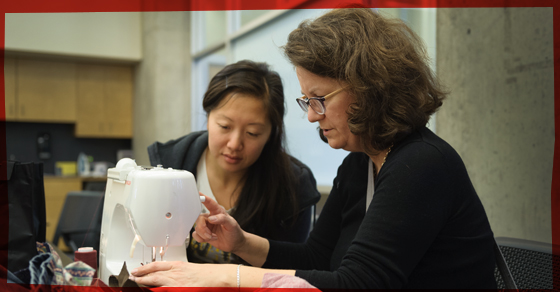Frameworq's Fashion Fix - Repairing textiles to resist a throwaway culture

About this story
- Organization
Frameworq Education Society - Region
Lower Mainland BC - Area of impact
Social Enterprise and Social Venture - Type of investment
Grant
Irina McKenzie’s “aha” moment came five years ago, as she read about people transforming used, well-worn clothing into new fashion items, a practice known as upcycling. Someone had repurposed an old t-shirt into a dress, she recalls. While diverting used clothes from the landfill struck her as an excellent idea, the results, in this case at least, were disappointing. “The upcycled clothes I saw were ugly,” McKenzie laughs. “But the mindset—taking what some people might consider garbage and making it useful again—was really interesting to me.”
Thus began her long journey into the complex worlds of textiles and fast fashion, something that McKenzie, a law school graduate, didn’t see coming. But the more she learned about textile waste and how it is handled in other countries, the more opportunities--and need--she saw here at home. “I was surprised at how little we talk about textile waste,” says McKenzie. As a result, she adds, many people aren’t aware it’s a problem, and don’t know they can help solve it.
McKenzie soon founded Frameworq Education Society (www.frameworq.ca), a Vancouver-based non-profit with a “mission to overthrow a throwaway culture.” It holds monthly “fix it” events at various locations around Metro Vancouver and the Lower Mainland, giving local residents a chance to mend their own clothes and other textile-based items, with hands-on instruction from volunteer experts in the craft.
Frameworq has teamed up with Vancity to bring fix it events to three of the credit union’s own branches, in Richmond, Surrey and Port Coquitlam. “Vancity is a natural partner, and helps us with everything we need,” says McKenzie. “With their emphasis on lighter living, we feel very much aligned.”
Frameworq’s fix-it events typically attract 20 to 40 people, from all walks of life and all age groups. Frameworq supplies the sewing machines and sewing materials; participants need only show up with clothes and other textile-based things in need of repair. It’s heartening to hear people share stories about their well-worn stuff, says McKenzie, and it’s especially gratifying to see their repaired goods used again with great pride. Including those old t-shirts.